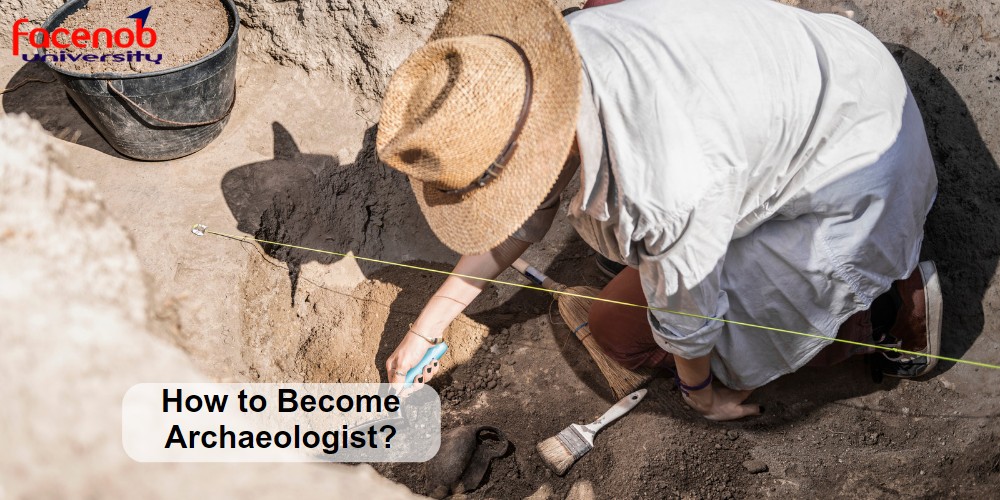How to Become an Archaeologist?

Introduction of Archaeologist
Archaeologists investigate historical puzzles using items that allow them to reconstruct the past. With context as their guide, they collect items from ancient sites to empty a time capsule from a specific historical era.
Similar Job Titles
- Curator
- Director of Research Center
- Egyptologist
- Principal Archaeologist
- Research Archaeologist

Typical Job Responsibilities
What do Archaeologists do?
An Archaeologist would typically need to:
- Record, interpret, and conserve archaeological relics such as tools, cave paintings, building ruins, and ceramics for future generations.
- Investigate, examine, or evaluate historical societies and cultures to find answers to specific study topics.
- Fieldwalking, geophysical surveys, aerial photography, and underwater recovery are all used to survey locations.
- Work on field excavations or digs using various digging equipment, usually as part of a team.
- Analyze findings by grouping, identifying, dating, and classifying them
- Record and interpret discoveries, places, and landscapes using computer software like Computer-Aided Design (CAD) and Geographical Information Systems (GIS).
- Use computers to simulate how a building, site, or artifact would have looked.
- Assist in curating and displaying artifacts while describing their physical properties or attributes.
- The project manages an excavation to locate possible archaeological sites while checking site reports on existing artifacts and topographic maps.
- Conduct laboratory tests such as radiocarbon dating and research desk-based assessments of sites.
- Check planning applications and identify any possibilities of archaeological impact.
- Record sites using drawings, detailed notes, or photography, and provide advice on the conservation or recording of archaeological remains.
- Ensure essential buildings, monuments, and sites are cleaned, protected, and preserved.
- Create publicity materials, such as articles regarding research on-site interpretations or excavations, to raise awareness through educational speeches and presentations.
Standard Work Environment
An archaeologist’s employment entails both outdoor activities and an indoor desk job. Employment is available in various settings, including laboratories, museums, workplaces, and outside at excavations or site inspections, which can be performed in all weather conditions.
Travel is a key aspect of this job, as archaeologists must frequently operate in various climates and socio-cultural settings. Experienced or senior workers working on specific projects may discover work or travel opportunities abroad.
Fieldwork requires equipment that can withstand the rigors of the job while remaining lightweight and cheap. Indoor employment requires a particular dress code depending on the location and nature of the work.
Work Schedule
There are no set schedules during site explorations, and archaeologists may be required to work most of the day. If the time window for a dig is short, you may need to work weekends and evenings.
Post-excavation work primarily consists of research and the drafting of publications and reports, and archaeologists can spend 40-hour weeks during this time. Teachers and researchers have the benefit of flexible working hours. Part-time employment may be available in some organizations.
Employers
Archaeologists typically begin their careers aiding older scholars in museums and archives. Such job openings are frequently publicized on websites and in publications. It could also be a good idea to join an archaeological society, as these organizations allow you to engage with people in the field. Because temporary contracts are common, self-employment or freelance work is an option. Specialist consultancy employment provides more options for experienced individuals.
Archaeologists are generally employed by:
- Commercial Planning & Development Consultancies
- Archaeological Field Units
- Archaeological Trusts
- National Archaeological Organizations
- Teaching & Research Institutions
- Amenity Societies
- Specialist Historic Building Contractors
- Private Developers Carrying out Rescue Archaeology
Unions / Professional Organizations
Professional associations and organizations are an important resource for archaeologists who want to further their professional development or interact with other experts in their industry or trade. Participation in one or more of these organizations looks great on your CV and helps to strengthen your credentials and qualifications as an archaeologist.
Workplace Challenges
- Fieldwork may be stressful with travel to remote areas or international locations, lasting 48 weeks or longer.
- Work that may extend over long hours to meet research deadlines and may involve rugged living conditions and strenuous physical exertion
- Adaptation to changing environments and integration into new social circles
- Research conducted in a foreign language
- Limited funding for projects
Suggested Work Experience
Job competition is fierce. Practical experience and the required fieldwork in an Archaeology degree will demonstrate your passion and curiosity.
Volunteering is an excellent method to obtain hands-on experience, and most volunteers begin as diggers who must be motivated and adaptable. For volunteer opportunities, contact the local entity of authorized Archaeology organizations.
Recommended Qualifications
To work as an archaeologist, you will often need a master’s degree in archaeology, ancient history, anthropology, conservation, or heritage management. For higher-level positions, a Ph.D. may be required. Doctoral degrees may also be required to apply for research grants. Aspiring archaeologists with a bachelor’s degree are typically recruited for entry-level positions such as trainee archaeologists, research assistants, and writers.
Archaeology is a vast field interconnected with many others, including geography, history, and social sciences. In other cases, a science degree such as biology, botany, medicine, geology, or environmental science may be more suited than an archaeological certification.
Qualifications in computing, CAD or Computer-Aided Design, Geographic Information Systems, or GIS may also be useful.
Certifications, Licenses, and Registration
Archaeologists may need a license before performing archaeological excavations in some regions. Individual government entities issue licenses, which often include passing a test and an interview and meet eligibility requirements such as a minimum level of education, work experience, training, or completion of an internship, residency, or apprenticeship. Aside from assuring sufficient skills and public welfare, licensing protects a country’s built heritage. You may also require a driver’s license to visit and from sites and offices.
By examining individuals who violate the program’s Code of Ethics, successful certification programs serve and safeguard the public welfare. They contribute to the future of a profession by gaining trust and respect.
Projected Career Map
Archaeology is a multifaceted field, and your career path will differ depending on your industry and specialty. An archaeologist’s publications mostly determine progress in this field. Individuals who have completed significant research can advance to higher degrees in administrative and research positions.
A typical fieldwork job path may comprise several years as a digger, followed by several years as a Site Supervisor, and then advancement to project management or a managerial role. Competition for positions can be severe in this relatively small yet popular profession. Accreditation displays dedication to your education, development, standards, and professional ethics. There are many levels based on your level of expertise and responsibility. Many employers require and encourage their employees to obtain professional accreditation.
Despite a recent drop in positions available with local governments, opportunities in the private sector, such as the need for archaeological services, are expected to grow. This is expected to increase prospects for job advancement. If you have specialized talents, you may be able to advance your career in fields such as conservation, heritage management, curating, and archaeological sciences. Some archaeologists prefer to continue their education and work as lecturers or academic researchers.
You must have knowledge, abilities, and flexibility to excel in this industry. Archaeologists can use these skills to pursue parallel professions as market and survey researchers, engineers, urban and regional planners, and statisticians.
Job Prospects
Candidates with knowledge, skills, and flexibility will have the best job prospects.
Beneficial Professional Development
Often, training is conducted on the job. To stay current on research and scientific advancements, you must take responsibility for your training and continuing professional development (CPD).
Certain professional organizations offer a limited number of work-based placements for young archaeologists with six to eighteen months of postgraduate experience. If you want to diversify into a new Archaeological branch or improve your skills, you should apply for one of them.
Several universities offer postgraduate courses in archaeology, bioarchaeology, landscape archaeology, and heritage management. Archaeologists with doctoral degrees are becoming increasingly prevalent. This could be especially valuable in areas like human or animal bone analysis or if you want to follow an academic career.
Conclusion of Archaeologist
Archaeology is similar to a jigsaw puzzle, except you can’t cheat or peek at the box; not all parts are present.
Advice from the Wise
Learn how to travel back in time and incorporate stories from the past into our daily life. Much is gone, but much endures… The process of meticulously replicating ancient items can reveal information on the lives and habits of the original craft workers in ways that no amount of armchair theorizing can.
Explore Also: How to Become Zoo Vet?
